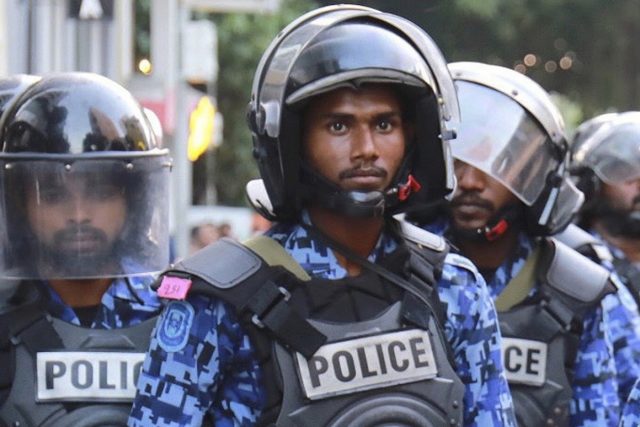
Briefs
Publication: Terrorism Monitor Volume: 17 Issue: 18
By:

Maldives: Presidential Commission Findings Prompt Proposed Changes to Anti-Terror Act
Brian M. Perkins
The Maldivian government introduced a sweeping new bill that would amend the 2015 Anti-Terrorism Act as the country continues to grapple with rising radicalization and the prospect of returning fighters. The proposed bill came just days after the release of alarming findings by a presidential commission’s inquiry into the deaths and disappearances of several prominent secularists, including journalist Ahmed Rilwan (Maldives Independent, September 1).
The commission revealed the extent of al-Qaeda and Islamic State (IS) recruitment networks in the Maldives as well as the prominence of Maldivians within IS. The inquiry found that Maldivian extremists first established ties with al-Qaeda in 2008 before the group eventually split into two factions, one loyal to al-Qaeda and the other to IS. The IS group, which seems to currently be the most active, is led by Mohamed Ameen. Following the commission’s findings, the United States designated Ameen as a key terrorist leader and recruiter for IS and imposed targeted sanctions against him.
According to the commission’s findings and the designation by the United States, Ameen began by recruiting Maldivians to fight alongside IS in Syria before beginning to send them to Afghanistan to fight with IS’ local branch, Islamic State Khurasan (IS-K) (Treasury.gov, September 10). Ameen and his network were reportedly holding around 10 recruitment sessions a week in the Maldivian capital, Male. Ameen is also believed to have been involved in the Sultan Park bombing that injured more than a dozen on September 29, 2017 and was arrested in Sri Lanka in 2011 and subsequently returned to the Maldives, where he was again released in May 2012 (Minivan News, October 15, 2011).
The revelations regarding Ameen shed further light on the expansive IS recruitment network in the Maldives as well as the intelligence gaps and legislative flaws that allowed him to go free and continue to operate. The new bill seeks to correct these deficiencies, namely by criminalizing speech and forms of expression in support of terrorist organizations, and criminalizing the act of facilitating any individual’s travel to fight alongside a terrorist group or any unsanctioned travel to countries specifically designated by the president and national security council (Maldives Independent, September 12). Additionally, the bill seeks to address the issue of repatriating fighters and their families, focusing on individual threat assessments and de-radicalization programs.
While the new legislation seemingly addresses many fundamental flaws that allowed militants such as Ameen to be released and operate recruitment networks, Maldivian citizens have already raised concerns over whether or not the government can fairly enforce the proposed laws or if they will increase the number of reported abuses and arbitrary detentions. Additionally, there has yet to be any announcement of a comprehensive security plan to address the alarming rate of radicalization or any notable successes in disrupting the expansive recruitment network.
***
Afghanistan: Al-Qaeda’s Growth Alongside Taliban Facilitates Militants in Kashmir
Brian M. Perkins
The long running and fraught peace negotiations with the Taliban appear to be faltering as the Taliban continues to conduct mass casualty attacks across the country and the U.S. government distances itself from the process. Internal turmoil within the Trump administration has undoubtedly affected the process and Trump declared the peace talks dead on September 9. The Taliban is currently at its strongest since the beginning of the war, and without any further steps to reduce the conflict, will continue to make gains across the country, which in turn has increasingly allowed al-Qaeda to regroup.
Despite the widespread notion that al-Qaeda is on the decline and that Afghanistan is no longer significant to the group, the country is likely to still prove key to its survival and to its global brand. Al-Qaeda still maintains its incredibly close relationship with the Taliban and Haqqani Network and has been reportedly regrouping and growing in Badakhshan, Kunar, Zabul, Helmand, and Kandahar (See Terrorism Monitor, June 12). Additionally, there have been reports of al-Qaeda taking in foreign fighters in Afghanistan. The location of al-Qaeda’s safe havens clearly correlates to the areas most tightly controlled by the Taliban.
Al-Qaeda is not only using the havens to regroup, grow, and communicate, but are also using Taliban cover to facilitate operations and logistics within Afghanistan as well as across the Indian subcontinent. Most notable of these connections is that between al-Qaeda in Afghanistan and its Kashmiri branch Ansar Ghazwat-ul-Hind (AGH), whose leader Zakir Musa was killed in May (See MLM, July 31). Following his death, al-Qaeda announced Hameed Lelhari (a.k.a Haroon Abbas) would take Musa’s place and emphasized the strong connection between its Afghan members and its Kashmiri front as well as relations with the Taliban (The Hindu, June 8). There have been multiple reports of Kashmiri militants fighting alongside al-Qaeda in Afghanistan, including Abdul Haseeb al-Kashmiri, who was killed in Ghazni in June (Twitter.com/RosannaMrtnz, June 22). Ghazni is also where Afghan forces uncovered a large weapons cache shared by the Taliban and al-Qaeda. Afghanistan’s ministry of defense claimed that the materials had entered from a “neighboring country”—avoiding directly stating Pakistan—and that al-Qaeda explosive experts were aiding the Taliban (Twitter.com/MoDAfghanistan, September 14).
The conflict in Kashmir and al-Qaeda’s resurgence in Afghanistan, particularly along the Afghanistan-Pakistan, are seemingly primed to increase in the coming months as peace negotiations falter and the Taliban grows stronger. Further, there is evidence of the cross-border movement of weapons and militants spanning from Kashmir across Pakistan and into Afghanistan. As the war in Afghanistan drags on, al-Qaeda will only gain further ground by drawing in more foreign fighters and providing key support to militants in Kashmir, a region primed for jihadist activity.




